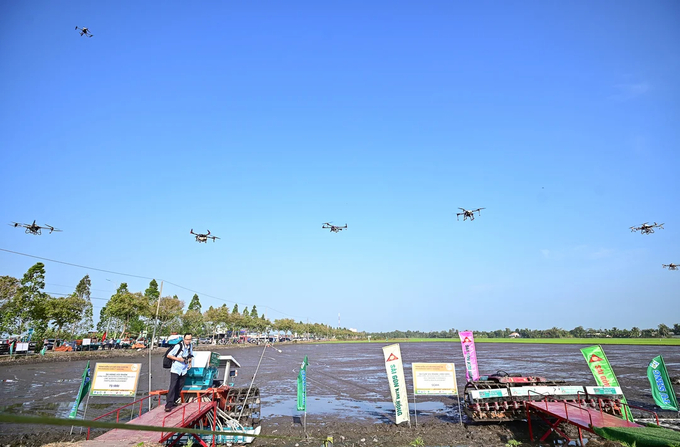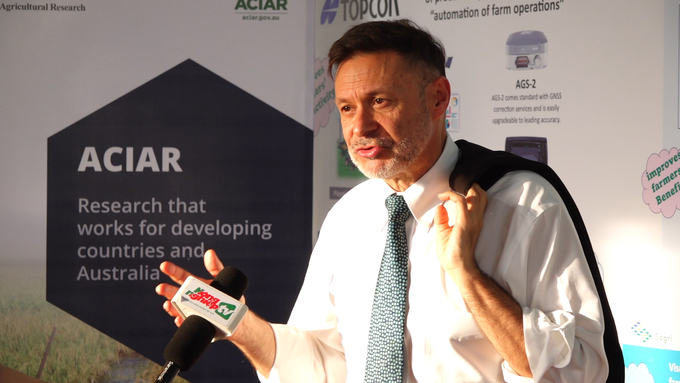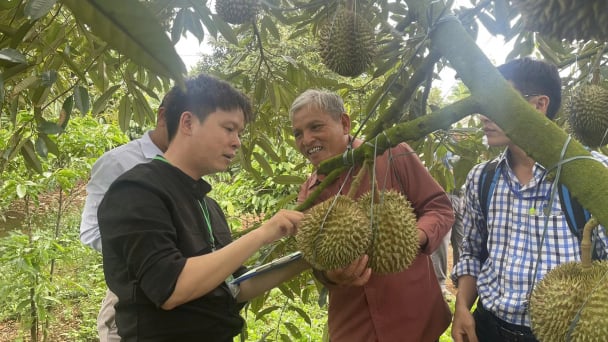June 1, 2025 | 11:01 GMT +7
June 1, 2025 | 11:01 GMT +7
Hotline: 0913.378.918
June 1, 2025 | 11:01 GMT +7
Hotline: 0913.378.918

Demonstration of agricultural mechanization at the Launching Ceremony of the 1 million hectare project specializing in high-quality and low-emission rice. Photo: Tung Dinh.
During the International Festival of Vietnam Rice Industry - Hau Giang 2023, Australian Ambassador to Vietnam Andrew Goledzinowski shared insights on the agricultural collaboration between Vietnam and Australia, as well as Vietnam's efforts towards developing a green, responsible, and sustainable agriculture through the "Project on sustainable development of 1 million hectares of high-quality, low-emission rice linked with green growth in the Mekong Delta region by 2030".
Sir, how do you assess this initiative?
Regarding the "Sustainable Development of One Million Hectares of High-Quality Rice Farming with Low Emissions Linked to Green Growth in the Mekong Delta by 2030" initiative, I believe it is a commendable initiative. The project holds promise for comprehensive planning in the Mekong Delta region. However, we must acknowledge that the goals Vietnam is pursuing are quite intricate. This initiative is not only part of efforts to ensure food security but also aligns with Vietnam's mission on climate change, safeguarding the robustness of the mighty Mekong River, and protecting the welfare of hundreds of thousands of small-scale farmers along the Mekong River. These are complex issues that demand sophisticated solutions.
I am pleased to observe that the Vietnamese government is seeking advice from various sources and consulting on these solutions. Of course, Australia is committed to partnering with Vietnam in finding these solutions, as I mentioned.

Australian Ambassador to Vietnam Andrew Goledzinowski shared about the 1 million hectares of rice project. Photo: Thanh Thuy.
COP28 has just concluded, with a strong focus on agricultural production, greenhouse gas reduction, and achieving net-zero emissions. So, what projects will Australia undertake to support Vietnam in achieving the common goal of green, sustainable agriculture and ensuring sustainable livelihoods for rice farmers?
Australia has been involved in the rice sector in the Mekong region since 1995, with 14 different projects related to sustainable rice production. Four of these projects are currently in progress, and we are collaborating with one of the non-governmental organizations on a 17 million AUD project starting later this year to encourage sustainable rice harvesting for small-scale producers in the Mekong Delta. We hope that by its completion, the project will involve the participation of up to 200,000 small-scale farming households, making it a highly significant initiative.
Next, I would like to mention that during the visit of Australian Minister for Foreign Affairs Penny Wong to Vietnam in August, she announced climate change response projects worth AUD 95 million in the Mekong Delta region, with a substantial portion allocated to agriculture. The project will involve researchers, businesses, small farmers, and the participation of both governmental and non-governmental organizations. Therefore, Australia will continue to be actively engaged in this field.
Another aspect to consider is that we are also rice farmers in Australia, involved in rice export, and encounter similar challenges in water management. Therefore, I believe that there is ample opportunity for mutual learning, and we should continue our collaboration on that basis.
Participating in the International Rice Festival in Vietnam, the conveyed message is "Prosperity originates from rice farmers." In your opinion, what does the Vietnamese government need to do to establish an ecosystem involving the state, scientists, businesses, and farmers in the production of high-quality rice, contributing to global food security?
I believe the Vietnamese government has a clear understanding of the challenges and is moving in the right direction with its decisions. The agricultural sector has learned from the past that not every environmental issue requires a technical solution.
Moving forward, we should seek broad opinions and advice from experts in various fields. Through this approach, I believe we will find the right answers.
Thank you!
During the previous working session with Can Tho City on enhancing trade and investment cooperation, Australian Ambassador to Vietnam Andrew Goledzinowski stated that Vietnam, in general, and the Mekong Delta, in particular, have implemented various solutions to address challenges such as saltwater intrusion, livelihood transformation, and landslides.
These solutions have yielded certain effectiveness. However, there are still limitations, such as the potential downstream consequences of building dikes to prevent saltwater intrusion leading to flooding and improper exploitation of groundwater resulting in subsidence and landslides.
In the agricultural sector, through collaboration with the Australian Centre for International Agricultural Research, the Australian government has worked with Vietnam to develop new varieties resilient to climate change. Both sides have implemented projects to ensure benefits and safety for coastal and saline-prone areas.
In the future, the Ambassador hopes that Vietnam and Australia will further promote collaboration in high-tech agriculture adapted to climate change.
Translated by Dieu Linh

(VAN) The prevention of plastic pollution necessitates collaboration among governments, businesses, and citizens. Today's little things contribute to a future free of plastic.

(VAN) This was the directive given by Deputy Minister Phung Duc Tien during a meeting with the Department of Livestock Production and Animal Health, and relevant stakeholders to prevent and control African swine fever.

(VAN) For the durian industry to succeed, the value chain must fulfill its commitments to the government, the community, and international partners.

(VAN) Vaccinating juvenile pangasius helps reduce disease, antibiotic use, and farming costs, increasing profits for export-oriented farmers in An Giang.

(VAN) Due to a limited supply of workforce and competitive recruitment requirements, businesses struggle to retain talented veterinary human resources.

(VAN) WOAH’s guidance aims to mitigate disease risks through a One Health approach that balances economic, conservation, and public health interests.

(VAN) Ms. Nguyen Thi Dung, Deputy Director of Ngoc Hoang Cooperative, shared about the journey of bringing dragon fruit to Europe, achieving annual revenues in the billions of VND.